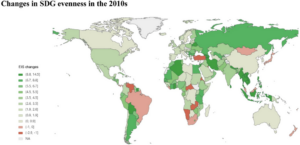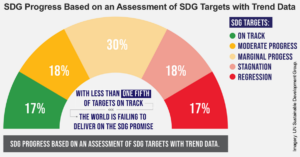
Scientific Evidence on the Political Impact of the Sustainable Development Goals
In 2015, the United Nations agreed on 17 Sustainable Development Goals (SDGs) as the central normative framework for sustainable development worldwide. The effectiveness of governing by such broad global goals, however, remains uncertain and the question arises whether these 17 SDGs have had any political impact withi ...
Posted on 18/03/25

SDGs and Inflation
The term "greenflation," which combines "green" meaning decarbonization and "inflation" meaning rising prices, has become widely known. As investment in fossil fuels has been curbed, demand for natural gas, which can have lower greenhouse gas emissions than coal, has increased, causing energy prices to rise. Addressi ...
Posted on 18/03/25

Scientists Alarmed: Lack of Political Action against Climate Change
Six out of nine planetary boundaries have already been breached with the seventh is about to be breached, too. Despite global promises, crucial policies fall short, which causes alarm amongst scientist. Carbon emissions are on the rise, natural feedback loops spiral downwards, and essential biodiversity targets remai ...
Posted on 18/03/25

2024 SDG Report: Global Progress Alarmingly Insufficient
The 2024 Sustainable Development Goals Report highlighted that nearly half the 17 targets are showing minimal or moderate progress, while over a one-third are stalled or going in reverse, since they were adopted by UN Member States back in 2015 to bring peace and prosperity for people and the planet. “This report is k ...
Posted on 18/03/25

Anti-SDG Sentiment and Actions
There is “no global anti-SDG sentiment, though these are starting to appear in some populist parties in several countries around the world”, so says the Journal of International Development Cooperation1. Moreover, it claims that “global support for Agenda 2030 has not yet eroded”. However, is says further that this “ ...
Posted on 17/03/25
Postings2025-01-08T09:00:41+02:00

